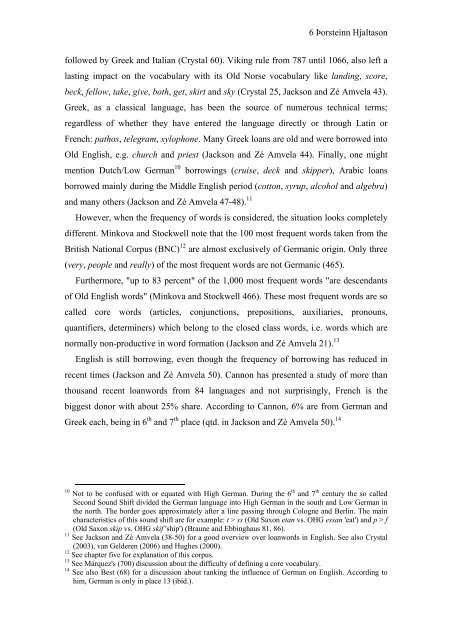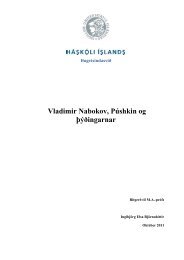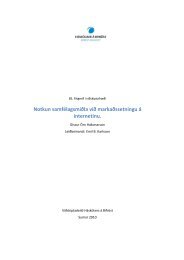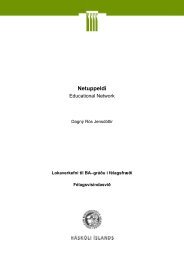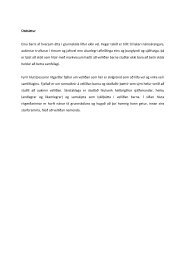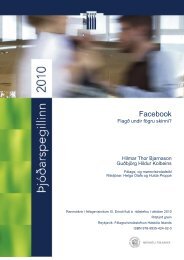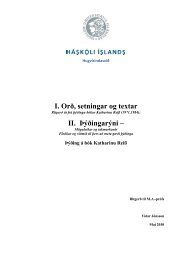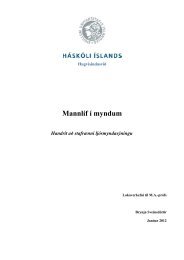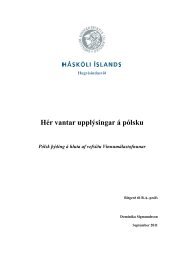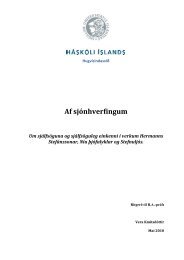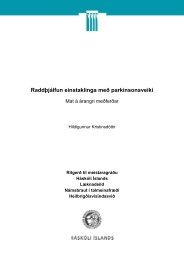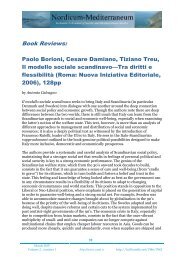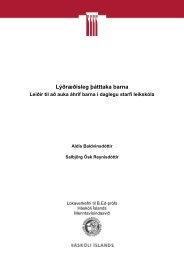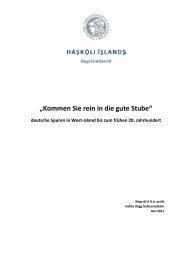Capturing the Zeitgeist Native German Loanwords in ... - Skemman
Capturing the Zeitgeist Native German Loanwords in ... - Skemman
Capturing the Zeitgeist Native German Loanwords in ... - Skemman
You also want an ePaper? Increase the reach of your titles
YUMPU automatically turns print PDFs into web optimized ePapers that Google loves.
6 Þorste<strong>in</strong>n Hjaltason<br />
followed by Greek and Italian (Crystal 60). Vik<strong>in</strong>g rule from 787 until 1066, also left a<br />
last<strong>in</strong>g impact on <strong>the</strong> vocabulary with its Old Norse vocabulary like land<strong>in</strong>g, score,<br />
beck, fellow, take, give, both, get, skirt and sky (Crystal 25, Jackson and Zé Amvela 43).<br />
Greek, as a classical language, has been <strong>the</strong> source of numerous technical terms;<br />
regardless of whe<strong>the</strong>r <strong>the</strong>y have entered <strong>the</strong> language directly or through Lat<strong>in</strong> or<br />
French: pathos, telegram, xylophone. Many Greek loans are old and were borrowed <strong>in</strong>to<br />
Old English, e.g. church and priest (Jackson and Zé Amvela 44). F<strong>in</strong>ally, one might<br />
mention Dutch/Low <strong>German</strong> 10 borrow<strong>in</strong>gs (cruise, deck and skipper), Arabic loans<br />
borrowed ma<strong>in</strong>ly dur<strong>in</strong>g <strong>the</strong> Middle English period (cotton, syrup, alcohol and algebra)<br />
and many o<strong>the</strong>rs (Jackson and Zé Amvela 47-48). 11<br />
However, when <strong>the</strong> frequency of words is considered, <strong>the</strong> situation looks completely<br />
different. M<strong>in</strong>kova and Stockwell note that <strong>the</strong> 100 most frequent words taken from <strong>the</strong><br />
British National Corpus (BNC) 12 are almost exclusively of <strong>German</strong>ic orig<strong>in</strong>. Only three<br />
(very, people and really) of <strong>the</strong> most frequent words are not <strong>German</strong>ic (465).<br />
Fur<strong>the</strong>rmore, "up to 83 percent" of <strong>the</strong> 1,000 most frequent words "are descendants<br />
of Old English words" (M<strong>in</strong>kova and Stockwell 466). These most frequent words are so<br />
called core words (articles, conjunctions, prepositions, auxiliaries, pronouns,<br />
quantifiers, determ<strong>in</strong>ers) which belong to <strong>the</strong> closed class words, i.e. words which are<br />
normally non-productive <strong>in</strong> word formation (Jackson and Zé Amvela 21). 13<br />
English is still borrow<strong>in</strong>g, even though <strong>the</strong> frequency of borrow<strong>in</strong>g has reduced <strong>in</strong><br />
recent times (Jackson and Zé Amvela 50). Cannon has presented a study of more than<br />
thousand recent loanwords from 84 languages and not surpris<strong>in</strong>gly, French is <strong>the</strong><br />
biggest donor with about 25% share. Accord<strong>in</strong>g to Cannon, 6% are from <strong>German</strong> and<br />
Greek each, be<strong>in</strong>g <strong>in</strong> 6 th and 7 th place (qtd. <strong>in</strong> Jackson and Zé Amvela 50). 14<br />
10 th th<br />
Not to be confused with or equated with High <strong>German</strong>. Dur<strong>in</strong>g <strong>the</strong> 6 and 7 century <strong>the</strong> so called<br />
Second Sound Shift divided <strong>the</strong> <strong>German</strong> language <strong>in</strong>to High <strong>German</strong> <strong>in</strong> <strong>the</strong> south and Low <strong>German</strong> <strong>in</strong><br />
<strong>the</strong> north. The border goes approximately after a l<strong>in</strong>e pass<strong>in</strong>g through Cologne and Berl<strong>in</strong>. The ma<strong>in</strong><br />
characteristics of this sound shift are for example: t > ss (Old Saxon etan vs. OHG essan 'eat') and p > f<br />
(Old Saxon skip vs. OHG skif 'ship') (Braune and Ebb<strong>in</strong>ghaus 81, 86).<br />
11<br />
See Jackson and Zé Amvela (38-50) for a good overview over loanwords <strong>in</strong> English. See also Crystal<br />
(2003), van Gelderen (2006) and Hughes (2000).<br />
12<br />
See chapter five for explanation of this corpus.<br />
13<br />
See Márquez's (700) discussion about <strong>the</strong> difficulty of def<strong>in</strong><strong>in</strong>g a core vocabulary.<br />
14<br />
See also Best (68) for a discussion about rank<strong>in</strong>g <strong>the</strong> <strong>in</strong>fluence of <strong>German</strong> on English. Accord<strong>in</strong>g to<br />
him, <strong>German</strong> is only <strong>in</strong> place 13 (ibid.).


